Recurring Collaborations
vestis virum facit, clothes make the man
— Erasmus, Adagia, 3.1.60, 1500

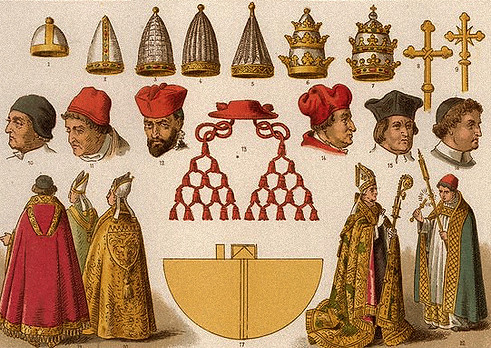
Popes, Romans
As a Renaissance scholar, Erasmus rephrased the proverbial wisdom of Latin writers dating back to Roman antiquity. He also collected, annotated and then used the proverbs to bolster his own arguments. Or to embellish his satirical writings. Thus, if clothyng makyth the man, then what maketh a pontiff? His cassock, his mitre, his slippers or, simply, his shoes?

According to Erasmus, not all popes are cut from the same cloth — some of them are made from modest linen, others from luxuriant silk — and only some are fit to enter heaven. With characteristic satire, the famed Dutch humanist and Catholic theologian reasoned that the remorseless Pope Julius II should be excluded from heaven and the extravagant but beneficent Leo X spared a trip to hell. It seems neither heaven nor hell deserved the likes of them.
For this post we turn to the transpersonal lives of six Catholic popes and the stuff they were once made of, or more specifically, the soul qualities they brought with them. The first three are seen in relation to their previous lives (who they had been), the latter to their last known incarnations (who they became). Their karmic connections have been revealed to us by El Ochre over three decades, c.1995 – 2025.
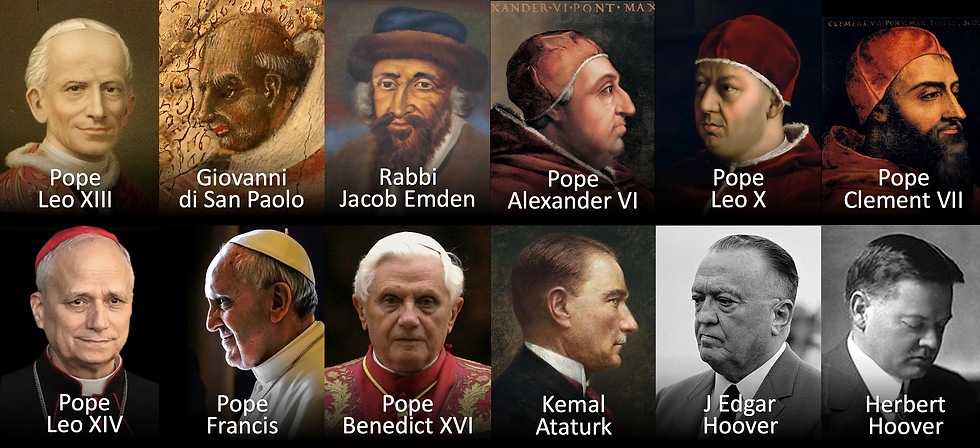


and Countrymen
Pope Leo XIV
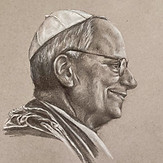
According to information recently received (El Ochre, 17 May 2025), Pope Leo XIV is indeed a reincarnation of Pope Leo XIII, the so-called Pope of the Workers. Born Robert Prevost (1955 – ) and Gioacchino Pecci (1810 – 1903), his lifeworks address the same challenges — how to defend human dignity, justice and labour in times of social and industrial upheaval. For Leo XIII it lay in the technological revolution of the late 19th century; for Leo XIV it is to be found in the current AI revolution. Both lives indicate a modern, open-minded and progressive spirit, something the world certainly needs right now. Upon his election, Leo XIII immediately set out to revive the theological system of St Augustine (later George Santayana) and Thomas Aquinas (later Rudolf Steiner), wishing to make it the official political, theological and philosophical foundation of the Catholic Church. Curiously, all three (Pecci, Santayana and Steiner) were contemporaries during the late 19th century. Before becoming pope, Leo XIV served extensively as a missionary official in Peru and, later at Pope Francis’ behest, as pontifical commissioner in Latin America. Leo succeeded Francis in 2025.

Pope Francis
Born in Argentina to a family of Italian origin, Jorge Bergoglio (1936 – 2025) was the first Jesuit and first Latin American to become head of the Catholic Church. He chose Francis as his pontifical name to honour the medieval poverello, poet and mystic, Saint Francis of Assisi. Significantly, in his own former life as Giovani di San Paolo (c.1150? – 1215), then a Benedictine monk and Cardinal-bishop, he supported his friend Francis in obtaining papal approval for the Franciscan Order. Pope Francis succeeded Benedict XVI in 2013, following the latter's retirement.

Pope Benedict XVI
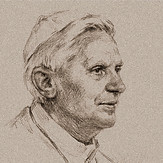
Born Joseph Ratzinger (1927 – 2022), Pope Benedict had once been Rabbi Jacob Emden, a 18th century German talmudist renowned for his profound wisdom and strict orthodoxy. By all accounts, he was a deeply traditional thinker who opposed dissent and heresy within the Jewish community (Sabbatean Controversy, 1750s). Two centuries later, as Cardinal Ratzinger, he actively promoted a book about the major arcana of the Tarot by Valentin Tomberg, the so-called heretic Catholic and dissident Anthroposophist, in which the anonymous author (Tomberg) contends that reincarnation is not only real but a necessary truth (Meditations on the Tarot, 1980). As noted elsewhere, karma has a way of turning events around to maintain a balance in the world. Here too we see karma working through select groups and individuals to bring about change. Pope Benedict resigned for health reasons in 2013 but remained pope emeritus until his death a decade later.
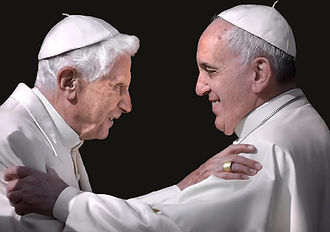
Pope Benedict and Pope Francis had a complex but cordial relationship, marked by mutual respect and disagreements. Francis inherited a Vatican fraught with scandals, including child sexual abuse and financial corruption. Shortly after his election (2013), Benedict handed Francis a large white box saying: "Everything is in here. Documents relating to the most difficult and painful situations. Cases of abuse, corruption, dark dealings, wrongdoings... I have arrived this far, taken these actions, removed these people, now it’s your turn." (cited by Carlo Musso in Pope Francis' biography Hope, 2025) We can only wonder what karma was at play here and who is since karmically indebted to the other?
We now look at three popes from an earlier period in history, a period of prominent families and rival cities.
Pope Alexander VI
Rodrigo Borgia (1431 – 1503 ) was born into a noble Spanish family which rose to prominence during the Italian Renaissance and, through nepotism and treachery, made an enemy of the Medici and Sforza. Rodrigo was the father of the infamous Casare and Lucrezia Borgia. We look at their transpersonal lives together here.
The Borgias produced two popes, including Alexander VI, who used the Vatican to increase the wealth and power of the family. While Rodrigo Borgia's name is synonymous with corruption and lust, much of his notoriety was embellished by his rivals. Bad karma makes bad reputations.

"Costly thy habit as thy purse can buy,
But not express'd in fancy; rich, not gaudy;
For the apparel oft proclaims the man.”
— Shakespeare, Hamlet, Act 1, Scene 3, c.1600
Although dress and decorum may reveal shared status and pedigree, even the same profession, men of the cloth are not necessarily cut from one fabric. Their differences aren’t the product of birth alone, nor of family inheritance or social circumstance, but of those soul qualities they brought with them from their past; such as love, compassion, serenity, pride, greed and wrath, etc.
Having tried to unite Christendom against the Turks, Alexander returned as Mustafa Kemal Atatürk (1881 – 1938), a Turkish soldier and statesman who became the founder-president of the Republic of Turkey in 1923 following his revolutionary abolition of the Ottoman dynasty. The name Atatürk means "Father of the Turks" and was granted him in recognition of his role in building the modern republic. He was an autocrat and undertook sweeping reforms — political, legal, religious, social and economic — which transformed the country into a secular and industrialised nation-state.

Rodrigo Borgia had previously been Tiberius Caesar (42 BCE – 37 CE), the reluctant Emperor, and reputedly “the gloomiest of men”. (Pliny the Elder, 37.5.23) As Tiberius he succeeded his stepfather, Augustus Caesar, and became emperor of Rome. Historical legend portrays him as cruel and debauched, but historians today commend his able administration. As a karmic footnote, Jesus Christ was crucified under Roman law during his reign. (Laurence Oliver, Out of Eden, 2001)

Pope Leo X
Leo X began as Giovanni de Medici (1475 – 1521), the son of Renaissance banker and benefactor, Lorenzo the Magnificent. He was himself a significant patron of the arts and a reputed hedonist who indulged in spending other peoples' money.
At the time, the rule of celibacy was more about limiting nepotism than it was about chastity. The rule was supposed to limit popes and priests from passing on church properties or possessions to sons and lovers.
Centuries later, as J Edgar Hoover (1895 – 1972), his reputation would again be tarnished by alleged abuses of power (blackmail) and rumoured sexual proclivities (homosexuality), which he hotly denied and fiercely condemned in others. Hoover’s name is today synonymous with the machinations of intelligence and security services in the United States (BOI, FBI), which he steered for half a century.
The Medici family produced four popes, including Leo X and Clement VII, plus two queens of France, namely Catherine de' Medici and Marie de' Medici.
Pope Clement VII
Born with the illustrious name Giulio di Giuliano de' Medici (1478 – 1534), he came to be known as “the unfortunate” after his pontificate was marked by political, military and religious upheavals. While regarded as a worldly statesman and wily diplomat, he was unable to unite the royal houses of Europe, leading to the Sack of Rome (1527); plus he underestimated the impact of the Lutheran and Anglican Schisms (1520s – 1530s) within the Church. Led by Luther, the Protestant Reformation (1517) was long in the making and would have been a thorn in the flesh of any pope.
Clement returned as Herbert Hoover (1874 – 1964), a wealthy philanthropist and president of the United States, who was likewise unfortunate with the political and economic turmoil of the 1930s. These included the Great Depression and its concomitant unemployment and immigration crises; plus the rise of Nazism in Germany. Once again, these factors were long in the making and beyond his control.


J Edgar Hoover and Herbert Hoover were not related by family. They were close friends and often met in Washington DC during the early 1920s. This photo shows them at a wartime 'old boys' dinner in 1944. Their surnames were often confused, resulting in them regularly receiving each other's mail throughout their lives.
As an addendum, power and corruption within the Church or State has been the subject of several recent films, dramas and memes. We include them here, despite their fictional slant, because they do illustrate the stuff these men are made of.
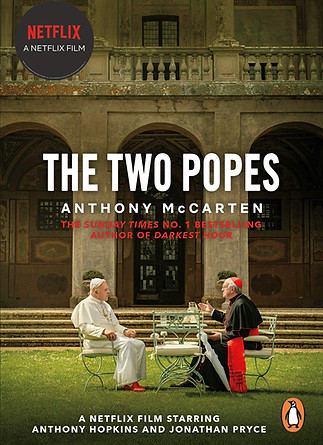


The Two Popes (2019) is a biographical movie about the transfer of power from Benedict to Francis, two very different men, both of whom live in the Vatican.
The Borgias (2011 – 2013) is a popular TV series dealing with bribery, extortion and torture around Pope Alexander VI and his family's rise to infamy in Italy.
J Edgar (2011) is a retrospective biopic about Hoover's FBI career and misfired liaisons. Directed by Clint Eastwood.
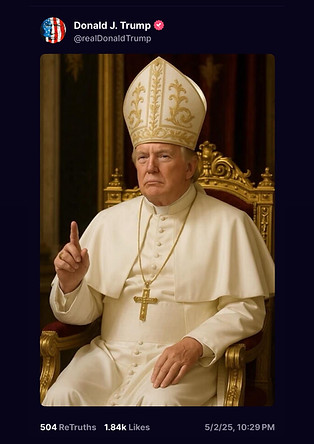

"The Catholics loved it," said President Trump about the AI-image of him as the new Pope after it appeared on White House media accounts (3 May 2025).
Here's another independently produced AI-meme, this time of Vice-President Vance as a character in The Handmaid's Tale, a perennial story in which divine law governs a patriarchal and totalitarian society. Written by best-selling novelist Margaret Atwood (1980), it has been adapted for cinema, theatre and opera. It is currently streaming as a TV series (2017 – 2025) and receiving critical reappraisal as a dystopian tragedy with parallels to Trump's New America — in which white Christian males dominate in a heady mix of sex, faith and power.

Our last example illustrates the relationship between faith and karma:
“Stephen Hawking is the reincarnation of a Roman Catholic Cardinal who was involved in the Church’s persecution of Giordano Bruno and of Galileo for their scientific doctrines. Hawking’s karma has cast him into the service of the science he once persecuted. The law of karma ever decrees that you must inevitably become that which you condemn.”
“Stephen Hawking’s soul has too long rejected everything spiritual; for even as a priest of the Church, his concern was not with spiritual truth but with temporal power; and thus it is his material-mindedness that has shackled him in such a disabled body. Unfortunately, so far he has not shown any change of attitude in his incarnate mind; but on a soul level he will learn of the limitations of matter, and of the transcendental potential of the mind.” (Laurence Oliver, unpublished notes, from conversations with El Ochre, shortly before Hawking’s passing in 2018)
Significantly, Hawking's life work dealt with black holes: "The message of this lecture is that black holes ain't as black as they are painted. They're not the eternal prisons they were once thought. Things can get out of a black hole both on the outside and possibly to another universe. So if you feel you are in a black hole, don't give up — there is a way out." (Inauguration of Harvard University's Black Hole Initiative, 18 April 2016)
As we know, life is itself a lecture, a learning experience wherein right confirms and wrong corrects. We use this example to neither praise nor pity him, but simply to illustrate what lessons life teaches us through karma.
Hawking's soul has since moved on and, hopefully, come to see the spiritual truth behind his life on earth. His last incarnation still remains a fine example for those who misjudge others by their outward appearances, with or without shoes.

